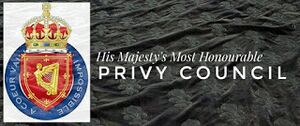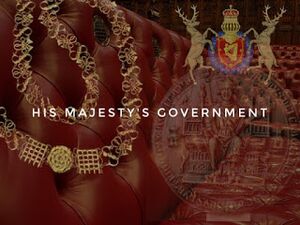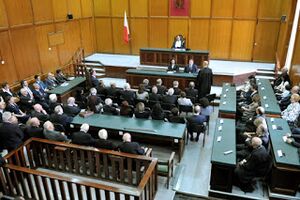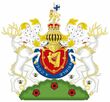Kingdom of Scone
This article's tone or style may not reflect the encyclopedic tone used on MicroWiki. |
This article or section marked as work-in-progress has not been edited in over seven days, but further work is required. Please notify the user who first added this template. |
Kingdom of Scone | |
|---|---|
| Anthem: God save the King | |
| Capital | Tartannac |
| Official languages | English |
| Demonym(s) | Sconnish |
| Government | Constitutional Monarchy |
• King | Erik II |
• Prime Minister | The Rt. Hon. Lord Dayton of Calder Valley |
| Legislature | Parliament |
| Establishment | 01 March 2014 |
| Time zone | STC |
Website Government Website | |
The Kingdom of Scone is a micronation and community dedicated to the celebration of the Anglo-Celtic cultures and traditions of the British Isles. The nation is considered by its members as miniature kingdom, but better known as a micronation that was founded on 1 March 2014 by James I, when it declared independence from the Glennish Kingdoms of Hanover and Sconeland.
Etymology
The Sconnish People have determined to structure and govern the community they form as a kingdom-in-miniature, complete with a figurehead king, a Westminster-style parliament, a government led by an elected prime minister, and a variety of other interesting political and cultural outlets which give form and atmosphere to the community.
History
This article or section marked as work-in-progress has not been edited in over seven days, but further work is required. Please notify the user who first added this template. |
National symbols
-
Flag
-
Coat of Arms
Politics
The Crown in Parliament

The Kingdom of Scone is a constitutional parliamentary monarchy according to the Westminster model seen throughout most of the English-speaking world. The King-in-Parliament is the most profound expression of the Sconnish State, and it is in and through Parliament that the Crown gives laws to the Sconnish people in the form of Acts of Parliament.
In our system of government, the Monarch reigns alone, but rules in cooperation with his people in the democratic institution of Parliament. Parliament consists of three distinct components: the sovereign, the Peers of the Realm and the Burgesses, composed by commoners. Each of the three constituent elements of Parliament has a voice and a role in the governing of the Kingdom of Scone and in the making of her laws.
According to the Charter of Scone Act, Parliament must sit at least once each calendar year. It is the Sovereign who opens and prorogues sessions of Parliament, or who dissolves Parliament on the advice of the Government. The State Opening of Parliament is the premier event of a Parliamentary session. On the occasion of the State Opening of Parliament, the King or his representative reads the Speech from the Throne.
At variance with the Westminster custom, the Throne Speech, also known as the "Gracious Speech" or the "King's Speech", is simply a personal greeting delivered by the monarch or his representative on the occasion of the opening of Parliament. The legislative programme of the Government is presented by the Prime Minister following the King's Speech.
At the moment, all fully-initiated Sconnish subjects are entitled to a seat and voice in Parliament for as often as Parliament shall sit. In Parliament, the Peers and Burgesses gather to consider bills and other matters brought before the "common council" of the Realm.
Bills passed during a session of Parliament are presented to the Sovereign at end of session for his Royal Assent. In another formal ceremony similar to the State Opening of Parliament, His Majesty or his representative signifies the royal approbation to each bill with the reading of the instrument granting the Royal Assent. Once the Royal Assent has been given to a bill, it becomes an Act of Parliament.
In addition to its legislative functions, the King-in-Parliament is the highest court of the Realm. Lords of Appeal in Ordinary, commonly referred to as "Law Lords," hear all cases appealed to the Appellate Committee of Parliament by lower Courts.
The Crown in Council

The day-to-day executive functions of the Realm are executed by the Privy Council on the advice of the Government of the day. His Majesty's Government is composed of the Prime Minister and other ministers, the secretaries of state appointed by the Sovereign, following an election. Orders-in-Council, to be understood as executive orders are issued by the Crown-in-Council as directed by the Prime Minister and the Cabinet. The Cabinet is the central committee of the Privy Council.
Current members
-
The Rt. Hon. & Learned the Viscount Berkely of Tara, The Lord Dayton, Baron of Calder Valley, KC, CSP, Bn
Lord High Steward -
The Rt. Hon. The Marquess of Avebury, CSP, GCGE
Lord High Chancellor -
His Royal Highness, The Duke of Bergen, CHM, CSP, CGE
Lord President of the Council -
The Most Noble The Duke of Marly, CKE, CSP, CGE
Lord High Admiral -
The Rt. Hon. The Countess of Sterlington, CGE
Lord Privy Seal -
The Rt Hon. Lady Korp of the River of Erewash, KC, CGE
Master of the Rolls -
The Rt Hon. The Lord Martin of Rotherham, Bt
Lord High Constable -
The Rt. Hon. & Learned Lord Ferguson of Penzance, Bt, KC
Lord Advocate -
The Rt. Hon. Sir Joost Jacobs, Bt.
Lord High Treasurer
Goverment

His Majesty's Government is formed and presided over by the Prime Minister, is responsible for the day-to-day administration of the Kingdom of Scone.
Prime Minister
The Prime Minister and the Government are responsible to Parliament. At any time, members of Parliament may request that the Prime Minister or any other Cabinet minister respond to questions concerning the Government's policies or activities. The details of anything not deemed by law to be an official secret of the State must be divulged at the request of any member of Parliament who has received permission from the Woolsack (Chair) to make inquiries. The Prime Minister or other ministers may also be asked to explain or defend their policies, actions, or statements to Parliament's satisfaction. The Prime Minister is elected every year by Parliament in Mid-October for a one-year term.
It is the Prime Minister's privilege and responsibility to advise the Sovereign on the formation of His Majesty's Government. From among Sconnish subjects qualified to sit in Parliament, the Prime Minister presents to the Sovereign the names of those persons he feels are best suited to constitute the Government. The Sovereign, in turn, appoints them on the Prime Minister's advice.
Members of His Majesty's Government who sit in Cabinet hold the various portfolios of His Majesty's Secretary of State. Each portfolio of responsibility is focused on an area of administration which has been established based upon needs identified by the sitting Prime Minister. Other ministers who are not strictly speaking considered Cabinet ministers (such as Ministers without Portfolio) may also comprise His Majesty's Government. Such ministers may, nevertheless, sit in on meetings of the Cabinet at the Prime Minister's discretion.
The current head of goverment of Scone is The Rt Hon. & Learned The Lord Dayton of Calder Valley, KC, CSP, appointed Prime Minister on 26 October 2021. Lord Dayton is the fourth Prime Minister of the Kingdom of Scone, appointed after the former Prime Minister, The Right Honourable the Earl of Ravensthorpe, GCGE, KC decided not to run for a third term.
Cabinet
His Majesty's Government, formed and presided over by the Prime Minister, is responsible for the day-to-day administration of the Kingdom of Scone.
The cabinet of the Kingdom of Scone as of October 26, 2021
-
The Right Honourable & Learned the Viscount Berkely of Tara, The Lord Dayton, Baron of Calder Valley, KC, CSP, Bn
Prime Minister
-
The Most Noble, Michael, The Duke of Marly, CKE, CSP, GCGE
Secretary of State for Foreign, Colonial and Developmental Affairs -
The Rt Hon. Brooke, The Lady Korp of the River of Erewash, KC, CGE
Secretary of State for Home Affairs -
The Rt Hon. & Learned, Adam, The Lord Ferguson of Penzance, Bt, KC
Secretary of State
Minister of Hospitality and Culture -
The Rt. Hon. Paul, The Lord Martin of Rotherham, Bt
Minister without Portfolio -
The Rt. Hon. Sir Joost Jacobs, First Baronet Greatforest
Governor of the Sconnish Treasury
Law and Judiciary

Between the Charter of Scone and several bills passed into law by Parliaments of the Kingdom, the Kingdom has built up several judicial organs throughout the Kingdom. These Courts handle various types of matters that may arise within the Kingdom requiring adjudication and are staffed by Sconnish Citizens.
The Court of Common Pleas
The Court of Common Pleas is the ordinary Court of First Instance within the Kingdom and hears both civil and criminal matters. The Court of Common Pleas may also be called upon to render legal opinions by the Government or a citizen of the Kingdom through the "Question of Law" process. Any citizen can introduce a civil or criminal case within the Kingdom of Scone through the Grosvenor Hall Facebook Group. Individuals concerned that a criminal matter should be considered before the Court are strongly encouraged to contact the Attorney or Solicitor-General first for assistance.
The Court of Common Pleas may consist of anywhere between 1-5 judges.
The Court is presided over by the Chief Judge who may issue administrative orders for the Court as he sees fit, within the bounds of Sconnish Law. All judges are appointed by His Majesty in Council and serve at the pleasure of His Majesty. Judgments made by the Court may be appealed to the Court of His Majesty the King in Parliament. Whenever Parliament is not sitting, appeals are heard by the Court of Lord High Steward instead.
The Court of Lord High Steward
The supreme judicial authority in Westminster Style systems has traditionally been placed in Parliament—but what happens when Parliament is prorogued and can not hear a matter? The Court of Lord High Steward is largely antiquated in modern Westminster-style systems, but centuries ago it served as a Court to hear cases that could only be heard by Parliament when it was prorogued, dissolved, or otherwise wasn't sitting. In the Kingdom of Scone, this Court serves a similar function, allowing appeals that would normally be heard by Parliament to be heard in this special Court instead whenever Parliament was otherwise not sitting and will not be sitting for at least 2 weeks from the date of appeal.
The Court of Lord High Steward just has one ordinary member: The Lord High Steward. Traditionally, this post has been held by the Prime Minister of the Kingdom. In the event of a conflict of interest, the Lord High Chancellor serves in this position. Judgments made by the Court may be appealed to the Court of His Majesty the King in Parliament once Parliament resumes sitting.
The Court of His Majesty the King in Parliament
The supreme judicial authority of the Kingdom is invested in His Majesty the King in Parliament and the decisions of this Court are final and may not be appealed any further. The Court of His Majesty the King in Parliament is comprised of the Lord Chancellor assisted by "Lords of Appeal in Ordinary" who are Peers of the Realm learned in law. This Court is an appellate Court, hearing appeals from inferior Courts. The Court also has original jurisdiction for any case where a person is accused of treason.
Head of Goverment
At the apex of the Sconnish state stands the Sovereign, and alongside him, the Royal Family.
The Royal House is the Royal House of Walsingham, comprised currently of the King Erik II and his Consort, Prince Ryen, the Viscount Thurmont of Maryland, KC, Bt. The Walsinghams stand as living symbols of Sconnish sovereignty and unity.
The former Royal House of Mountwelland will continue through the establishment of a cadet branch by His Royal Highness, the Duke of Mountbarry, formerly King Edward of Scone.
The King
Erik II

The third and current reigning Sovereign of the Kingdom of Scone is His Majesty, King Erik II.The Sconnish Parliament, according to the laws of the Kingdom of Scone, unanimously proclaimed The Duke of Walsingham as the King of Scone on March 6, 2020. Following the abdication of Edward I and Erik’s service as Prime Minister.
His Majesty has taken on the regnal name of King Erik. He has taken this name out of respect for his father, Erik. The Morning of March 6, 2020, His Majesty's Most Honourable Privy Council proclaimed His Majesty King Erik II as the undoubted Sovereign of the Kingdom of Scone.
His Majesty was coronated on May 17, 2020 and declared that his Royal House would be called, The Royal House of Walsingham. In July 0f 2020, His Majesty did name his husband, the Viscount Thurmont of Maryland, KC, Bt, His Royal Highness, the Prince-Consort.
Edward I

Edward I began his citizenship journey by carving out a niche for himself in the field of heraldry. He would eventually found and preside over the Sconnish College of Arms as Ilion King of Arms and later as Great Marshal of the Kingdom of Scone.
Edward would eventually catch the notice of the Royal Court, finding himself invited by his predecessor, King James, to be initiated into the ranks of Sconnish royalty. He and his colleague in the College of Arms, Sir. W. Moray, would both be tapped to join James in forming the Kingdom of Scone's first royal house, which would be christened the "House of Mountwelland."
On 12 December 2017, Edward and Moray were formally cloaked in the royal purple by King James, who bestowed the dignity of Prince of the Kingdom of Scone upon both men. Edward became His Royal Highness The Prince Edward, Moray His Royal Highness The Prince Patrick.
With an eye on the future of the Sconnish Monarchy and recognizing the need to designate an heir apparent, James decided to call upon Prince Edward to accept the honour and the burden of becoming the Kingdom of Scone's first Prince Royal, the title given to the Sconnish heir apparent. Edward pondered the invitation for some time before finally consenting to the King's proposal.
On 13 April 2018, Prince Edward Patrick Theobald Louis Alexander Barry was solemnly invested as the first Prince Royal of the Kingdom of Scone, with right of immediate succession to the Sconnish Throne upon the death or abdication of the Sovereign.
It was announced at the same time that King James had decided to declare himself lawfully indisposed to attend to the duties of the head of state for a time, and that the newly-elevated Prince Royal would soon, therefore, take on the role of the kingdom's Regent.
As Regent of the Kingdom of Scone and of the Glennish Empire, Prince Edward exhibited a reassuring executive presence within the apparatus of the state. Parliament would be prorogued for its annual Summer recess, and a period of calm would follow.
As Prince Regent, Edward would establish the Noble Order of the Baronial Eagle, the first ever Crown honour instituted by a person other than the Sovereign. The remainder of the Regency found itself blessed by the quiet of Summer, with the Regent and King James consulting occasionally, the latter hoping to acquaint the Regent with the responsibilities of his role.
The tranquility of the Summer months of 2018, as it happened, did not portend placid waters ahead for the Prince Regent. Soon, Edward would be summoned by history to assume his ultimate role as a Sconnishman.
On 15 September 2018, His Majesty King James, in his first appearance since the beginning of the Regency, delivered a semi-public address to his Court. In the course of his remarks delivered via video presentation, the King announced his decision to inform his Government of his intention to abdicate the Glennish throne.
Prince Edward had already known of the King's decision for some time, and was in receipt, by then, of the King's signed instrument of abdication. The Prince Regent, witnessing the instrument with his own signature, signed off on his own fate as well as that of King James.
At the stroke of noon on 1 October 2018, Edward succeeded King James upon the Sconnish throne as the Kingdom of Scone's second monarch.
Across the Empire, Sconnishmen celebrated the dawn of the Sconnish Edwardian era, happy to have as their sovereign a man they had come to admire as their Regent. From the start, King Edward signified his commitment to the Empire and to the grand traditions of Sconnish chivalry. Among the first acts of Edward's reign was to establish a new honour styled the Order of the Glennish Empire.
King Edward I reigns beside his consort, the Queen. They and their young family have given the Kingdom of Scone, for the first time, a proper and immediate Royal Family within the House of Mountwelland. Together, they serve as a model first family for all Sconnishmen to admire and take pride in.
James I

The Kingdom of Scone was conceived of and designed by our first monarch, King James, as early as the year 2008. His project, originally called "Sconeland," was a concept for an Anglophile kingdom with Celtic influences modeled after Great Britain. Events conspired to prevent the launch of the Sconeland project as an independent kingdom. Instead, it would find itself married to the miniature Kingdom of Hanover, a venture which James had launched earlier on, in 2002.
Together, Hanover and the Sconnish project formed a polity styled "The Glennish Kingdoms of Hanover and Sconeland." Sconeland would eventually come into being as an independent miniature kingdom, however, on 1 March 2014 when the unified Glennish Kingdoms were dissolved. Sconeland was re-christened "The Kingdom of Scone," and James the concept designer became James the king. The Kingdom of Hanover would go her separate way.
King James' reign was necessarily a reign of firsts. He was ceremonially installed as first King of the Sconnish on 17 March 2014. His inaugural rites consisted of an auto-coronation followed by a Throne Speech opening the very first Sconnish Parliament. James authored the Charter of Scone, enacted by that first Parliament, and much of the early legislation to follow. King James directed the creation of the Kingdom of Scone's public infrastructure, establishing her social media. James also presided over the installation of the first Sconnish Government led by the first Sconnish Prime Minister (and first democratically-elected Sconnish public official), the Earl of Rockcliffe.
Scone's first king would go on to establish the Sconnish Peerage and the Sconnish Honours System, which included the Order of Scone, the Order of the Sconnish Poppy, the Order of the Imperial Star of Glennain, the King's Army, the Royal Navy, the rank of Sconnish Banneret, and the Hereditary Knight of Murchaidh. James would also lay the foundations of the Sconnish gentry by creating the ranks of Baronet and Laird. During the course of his inaugural reign, James published Honours Lists several times a year signifying his intention to decorate subjects and foreigners alike with the various honours which he had established.
In 2016, an unexpected twist of fate brought the miniature Kingdom of Hanover back into the possession of King James, her founder and first king. This peculiar circumstance proved one of the more colourful episodes of James' reign, and would curiously alter the definitions and titles of the Sconnish community going forward.
The Kingdom of Hanover would ultimately find herself divided in half by the terms of a treaty between James and a rival claimant to the Hanoverian throne. James's half of the old kingdom was ultimately re-christened "Glennish Hanover," since his was the half that was declared by the treaty to be the inheritor of all the traditional attributes of the now dissolved Glennish Kingdoms of Hanover and Sconeland.
For a short time, King James was the sovereign of two completely separate and independent kingdoms. Although over Scone, James reigned as a constitutional figurehead, his authority over the Kingdom of Glennish Hanover was absolute. Glennish Hanover was eventually donated to the Kingdom of Scone by King James, then formally secured to the Sconnish Crown as a colonial dependency by an Act of Parliament. The Kingdom of Scone and the Colonial Province of Glennish Hanover, together, became known as "The Glennains" or the "Glennish Empire," thus accounting for the King of Scone's secondary title "Emperor of All the Glennains."
All-in-all, the Hanoverian episode and the effects of it constituted a quirky and sometimes inscrutable twist which causes confusion and head-scratching to the present day. In the Summer of 2016, King James invited Viscount Marly of Blaismont (today the Duke of Marly) to be installed as the first Royal Governor over the Colonial Province of Glennish Hanover. Today, Glennish Hanover provides a quaint colonial element within the Sconnish commonwealth for persons looking for a more relaxed and scaled-back version of the Kingdom of Scone.
In 2018, King James, together with then Prince Edward and then Prince Patrick, formed the first and current Royal House of the Kingdom of Scone, the House of Mountwelland. Prior to then, the Kingdom of Scone had suffered from the lack of a royal house, leaving the King to attempt to project the institution of the monarchy entirely on his own.
In his Speech from the Throne opening the 2017-2018 Parliament, James addressed the need for the establishment of a royal house, frankly confessing his struggles in attempting to be for the community the sole expression of Sconnish royalty. Edward and Patrick had been recruited to assist the King in carrying the royal burden, and Parliament was asked to be understanding of James' need for support and assistance from others in the execution of his royal duties.
In 2018, James would ensure a smooth transition from his reign to the next by installing Prince Edward as his heir-apparent with the title of Prince Royal. James was relieved to know that the Mountwelland succession to the throne had been secured, and was happy to observe that the new Prince Royal enjoyed the respect and support of the overwhelming majority of his people.
On 13 April 2018, King James informed Parliament that he would be indisposed to attend to his duties as Sovereign for a time, beginning 21 May 2018. From that date forward, therefore, the Kingdom of Scone experienced a Regency, with Prince Edward acting in James' place as head of state. As it happened, the initiation of a Regency would be James' last official act as Sovereign.
On 15 September 2018, King James delivered an address to the Court at St Ives' declaring his intention to depart the throne in favour of the Prince Regent. James intimated to his successor that he believed he had "exhausted the topic" of his hopes and aspirations for the Kingdom of Scone, determining that the time had come for him to step aside.
James, King of the Sconnish and Emperor of All the Glennains formally abdicated on 1 October 2018, ending his brief reign of only four years and seven months.
Today, King James remains a member of the House of Mountwelland and a Sconnishman, but has resolved to abide in virtual seclusion for the remainder of his post-regnal years. The founding member of the Ancient and Venerable Order of Huntsmen, James continues to preside over the Grand Lodge of Tartannac, holding the title of Grand Huntsman.
The 51-year-old founding monarch of the Kingdom of Scone returned to the Sconnish community today following an absence of nearly four years. James abdicated the Sconnish throne in October of 2018.
Following a series of diplomatic discussions with His Majesty The King over several months in 2022, King James consented to repatriate himself within the Sconnish polity at the rank of prince of the Glennish Empire, a new title devised by the Crown for the use of former Glennish sovereigns.
Reciprocally, James, as the currently reigning sovereign of Great Hanover, bestowed the old Hanoverian title of Prince of Emden upon His Majesty King Erik II in April 2022.
After completing an application for Sconnish citizenship this morning, James was subsequently summoned to Parliament to subscribe to the affirmation of loyalty in the presence of the lord chancellor.
As a Sconnish subject, James is formally styled "His Imperial Highness The Prince James". Prince James has pledged to assist His Majesty The King with various ceremonial tasks and other projects with the objective of expanding the projection of the institution of the monarchy throughout the Glennish Empire.
The Court at St. Ives'
The Court of the Sconnish Monarch and His Majesty's Royal Household are known institutionally under the name of "The Court at St Ives'." The name serves as a metonym for the monarchy, itself, but reflects no particular place or structure.
Society
Sconnish peerage
Ranking at the pinnacle of Sconnish society, the Peers and Peeresses of the Realm are men and women who have received the special favour of the Crown in the expectation that they will serve the Realm with most particular devotion, honour, and distinction.
According to Article IX of the Charter of Scone Act 2014, the Sovereign "shall be free to constitute a Peerage through the creation, by Letters Patent, of any ranks or titles of nobility that he shall think fit from time to time to create, and to elevate to the Peerage such subjects as he shall think fit to elevate."
On 30 June 2014, the Sconnish Peerage came into being with the creation of the very first Peers of the Kingdom of Scone, the Marquess of Lindenlea, the former Earl of Rockcliffe, and the Viscount Bracebridge of Heathminster.
Sconnish Peers and Peeresses are ranked according to the same degrees traditionally employed in the United Kingdom. The degrees of the Sconnish Peerage are, in descending order: Duke/Duchess, followed by Marquess/Marchioness, Earl/Countess, Viscount/Viscountess and finally Baron/Baroness.
The College of Arms
The College of Arms, is a royal corporation consisting of officers of arms, with jurisdiction over Scone and its Commonwealth realms and headed by the Great Marshall of the Kingdom of Scone and Lord Ilion King of Arms and his heralds of which there is currently two others being the Breninton and Glenstuart Herald of Arms in Ordinary and the Thistle Herald of Arms in Ordinary. The heralds are appointed by the Sconnish Sovereign and are delegated authority to act on behalf of the Crown in all matters of heraldry, the granting of new coats of arms and the recording of pedigrees. The College is also the official body responsible for matters relating to the flying of flags on land, and it maintains the official registers of flags and other national symbols.
The College of Arms also undertakes and consults on the planning of many ceremonial occasions such as coronations, state funerals, the annual Knighthood Services and the State Opening of Parliament. Heralds of the College accompany the sovereign on many of these occasions.




